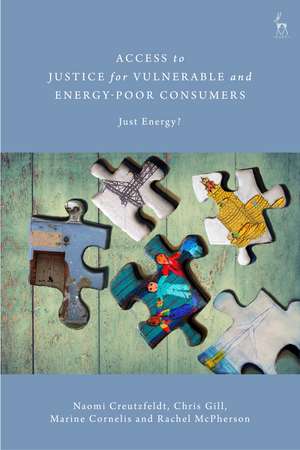Access to Justice for Vulnerable and Energy-Poor Consumers: Just Energy?
Autor Naomi Creutzfeldt, Chris Gill, Marine Cornelis, Dr Rachel McPhersonen Limba Engleză Paperback – 22 feb 2023
Toate formatele și edițiile
| Toate formatele și edițiile | Preț | Express |
|---|---|---|
| Paperback (1) | 307.32 lei 43-57 zile | |
| Bloomsbury Publishing – 22 feb 2023 | 307.32 lei 43-57 zile | |
| Hardback (1) | 542.19 lei 43-57 zile | +117.98 lei 5-11 zile |
| Bloomsbury Publishing – 11 aug 2021 | 542.19 lei 43-57 zile | +117.98 lei 5-11 zile |
Preț: 307.32 lei
Preț vechi: 374.72 lei
-18% Nou
Puncte Express: 461
Preț estimativ în valută:
58.80€ • 61.56$ • 48.66£
58.80€ • 61.56$ • 48.66£
Carte tipărită la comandă
Livrare economică 07-21 aprilie
Preluare comenzi: 021 569.72.76
Specificații
ISBN-13: 9781509950492
ISBN-10: 1509950494
Pagini: 384
Dimensiuni: 156 x 234 x 25 mm
Greutate: 0.47 kg
Editura: Bloomsbury Publishing
Colecția Hart Publishing
Locul publicării:London, United Kingdom
ISBN-10: 1509950494
Pagini: 384
Dimensiuni: 156 x 234 x 25 mm
Greutate: 0.47 kg
Editura: Bloomsbury Publishing
Colecția Hart Publishing
Locul publicării:London, United Kingdom
Caracteristici
Insightful socio-legal empirical inquiry, which provides a fresh lens to discussions of access to justice for energy consumers
Notă biografică
Naomi Creutzfeldt is Reader in Socio-Legal Studies at the University of Westminster, UK.Chris Gill is Lecturer in Public Law at the University of Glasgow, UK.Marine Cornelis is Executive Director and Founder of the policy consultancy Next Energy Consumer, Italy. Rachel McPherson is Lecturer in Criminal Law at the University of Glasgow, UK.
Cuprins
Introduction I. Introduction II. An Orientation to Key Concepts III. Contribution to Socio-Legal Scholarship IV. Outline of the Book's Content and Argument V. A Note on Case Study Selection and Methodology VI. The Structure of this Book PART IACCESS TO JUSTICE FOR VULNERABLE AND ENERGY-POOR CONSUMERS1. The Access to Justice Challenge I. Introduction II. The Scale and Nature of the Access to Justice Challenge III. Understanding the Barriers to Access to Justice IV. Particular Barriers Facing Energy Consumers V. Consumer Vulnerability and Energy Poverty as Barriers to Accessing Justice VI. Barriers Experienced by Vulnerable and Energy-Poor Consumers: Highlights from Our Data VII. Conclusion 2. A Holistic Vision of Access to Justice I. Introduction II. Access to Justice Beyond Lawyers and Courts III. Beyond Procedural Access to Justice IV. Reforming Access to Justice V. Conclusion 3. European Union Law and Policy on Access to Justice I. Introduction II. Recognition of Vulnerability and Energy Poverty in EU Law and Policy III. The Development of ADR for Consumer Disputes in the Energy Sector IV. Access to Justice, Collective Redress and Consumer Protection Measures V. Ongoing Problems for Vulnerable and Energy-Poor Consumers in the European Energy Market VI. Conclusion 4. ADR and Access to Justice I. Introduction II. Initial Observations Based on the Access to Justice Literature III. The Critical Debate on Access to Justice and ADR IV. Specific Issues in the Consumer-Disputing Context V. Conclusions 5. ADR and Access to Justice: Empirical Insights I. Introduction II. Empirical Insights III. Discussion IV. Conclusion 6. Everyday Experiences and the Role of Local Actors I. Introduction II. Legal Alienation, Relational Distance and Access to Justice III. Vulnerable and Energy-Poor Consumers, the Energy Market and Formal Institutions: Stories of Alienationand Disconnection IV. Local Actors: More than Intermediaries V. Conclusion 7. Towards a More Holistic System of Access to Justice I. Introduction II. Recapping the Argument of the Book III. Dispute System Design and the Delivery of Holistic Access to Justice IV. From Added Value to Inclusive Design: Overview of Design Options V. Limitations and Directions for Future Research VI. Conclusion PART IIACCESS TO JUSTICE, ADR AND ENERGY POVERTY IN FIVE COUNTRIES8. Introduction to Part II I. Outline of Chapters 9. Energy Injustice in Bulgaria Teodora PenevaI. Introduction II. Energy Poverty in Bulgaria III. Consumer Protection Mechanism IV. Key Areas of Energy Injustice V. The Energy Injustice Labyrinth in Bulgaria VI. Constraints for Energy Justice in Bulgaria VII. Conclusions 10. Energy Poverty and Access to Justice in Catalonia Anaïs Varo and Enric R Bartlett CastellàI. Introduction II. The Spanish Electrical System III. Vulnerable Consumers and Access to Energy Justice in CataloniaIV. Energy Poverty: What are the Gaps in the Current Measures? V. Moving Towards a Just Energy Model:Policy Implications VI. Conclusions 11. Access to Justice and Energy Poverty in France Marine CornelisI. Introduction II. Energy Poverty III. A Complex ADR Landscape: Divided between the National Public Ombudsman, Company Mediators and Other Public Parties IV. What are the Barriers to Access Justice for Energy Consumers? V. What Role does ADR (Ombuds) Play in Accessing Justice for Energy-Poor and Vulnerable Consumers? VI. How can Vulnerable Consumers Access Justice? VII. What can be done to Improve the Situation? VIII. Conclusion 12. Access to Justice for Vulnerable and Energy-Poor Consumers in Italy: Policy Measures and the Role of ADR Sarah Supino and Benedetta VoltaggioI. Italian Policies to Tackle Energy Poverty II. Access to Justice for Vulnerable and Energy-Poor Consumers in Italy: The Role of ADR III. Data on ADR Procedures in the Energy Sector IV. Conclusions 13. Access to Justice in Energy: United KingdomCosmo GrahamI. Introduction II. The Legal Framework of Energy Regulation in Great Britain III. The GB Energy Industry IV. The Fuel Poverty Strategy V. Complaints against Energy Companies VI. Conclusion
Recenzii
A compelling and original contribution to the socio-legal literature on access to justice . the first such study of access to justice relating to the European energy market . It should appeal to any scholar - experienced academic or student . [and] of great value to those working in or on energy poverty because it makes a powerful and well-informed case for reform and ensuring that systems of ADR feel accessible to those who need them. The current energy crisis highlights the need for such reform.
